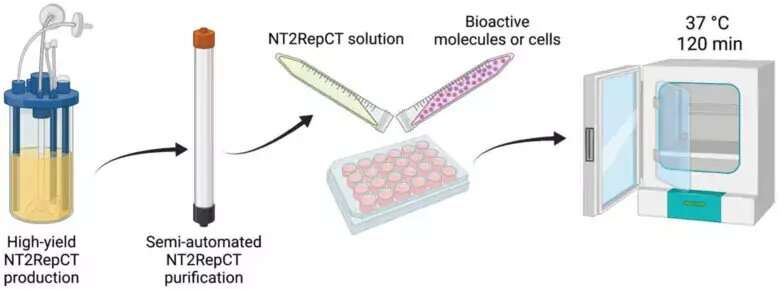Recombinant and tunable spidroin hydrogels for drug release and cell culture

In a new study, researchers at Karolinska Institutet show that recombinant spider silk protein hydrogels have many attractive features. They allow encapsulation of cells and bioactive molecules simply by incubation at 37°C. They are transparent, which allows monitoring of encapsulated cells, and the fibrillar network mimics that of the extracellular matrix. The mechanical properties of these hydrogels match those of different tissues, and the gels can be used for continuous drug release.
If manufactured from proteins produced in heterologous hosts, artificial spider silk is a promising biomaterial. Researchers at the Department of Biosciences and Nutrition, at Karolinska Institutet, have previously developed a biomimetic spider silk production method, which enables the production of artificial spider silk proteins and fibers, without involving harsh organic solvents.
This was made possible by the design of a small spider silk protein (spidroin). A big advantage of this mini-spidroin is that it can be produced in large quantities (14.5g purified protein per liter culture in bioreactors) and is possible to purify in a semi-automated process.
Recently, the team discovered that recombinant mini-spidroins form hydrogels within minutes, if incubated at 37°C, i.e., without the use of crosslinkers. The temperature and time range for gel formation are compatible with most bioactive agents and living cells, and the gels are composed of a nano-sized fibrillar network, opening-up possibilities of developing a novel hydrogel system for cell culture and tissue engineering.
Tunable to match different tissues
The researchers Tina Arndt and Urmimala Chatterjee, show in their new study, published in Advanced Functional Materials that human fetal mesenchymal stem cells can be encapsulated in these hydrogels, after which they show high survival and viability. Interestingly, the mechanical properties of the hydrogels can be tuned by changing the protein concentration to match those of different tissues, e.g., muscles and cartilage.
Furthermore, mixtures of recombinant spider silk proteins and green fluorescent protein (GFP) form gels, from which functional GFP is gradually released, indicating that bioactive molecules, easily included in the gels, maintain their activity and can diffuse through the gel. This means that the hydrogels have potential applications in drug delivery.
Along the same line, encapsulated ARPE-19 cells are viable and continuously produce the growth factor progranulin, which is released from the cells, then diffuses through the hydrogel and is detected in the cell culture medium over the study period of 31 days.
More information:
Tina Arndt et al, Tuneable Recombinant Spider Silk Protein Hydrogels for Drug Release and 3D Cell Culture, Advanced Functional Materials (2023). DOI: 10.1002/adfm.202303622
Citation:
Recombinant and tunable spidroin hydrogels for drug release and cell culture (2023, June 2)
retrieved 2 June 2023
from https://phys.org/news/2023-06-recombinant-tunable-spidroin-hydrogels-drug.html
This document is subject to copyright. Apart from any fair dealing for the purpose of private study or research, no
part may be reproduced without the written permission. The content is provided for information purposes only.
For all the latest Science News Click Here
For the latest news and updates, follow us on Google News.

